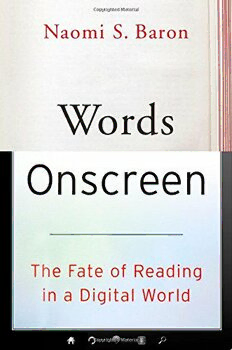
Words Onscreen: The Fate of Reading in a Digital World PDF
Preview Words Onscreen: The Fate of Reading in a Digital World
Words Onscreen Words The Fate of Onscreen Reading in a Digital World Naomi S. Baron 1 1 Oxford University Press is a department of the University of Oxford. It furthers the University’s objective of excellence in research, scholarship, and education by publishing worldwide. Oxford New York Auckland Cape Town Dar es Salaam Hong Kong Karachi Kuala Lumpur Madrid Melbourne Mexico City Nairobi New Delhi Shanghai Taipei Toronto With offices in Argentina Austria Brazil Chile Czech Republic France Greece Guatemala Hungary Italy Japan Poland Portugal Singapore South Korea Switzerland Thailand Turkey Ukraine Vietnam Oxford is a registered trade mark of Oxford University Press in the UK and certain other countries. Published in the United States of America by Oxford University Press 198 Madison Avenue, New York, NY 10016 © Naomi S. Baron 2015 All rights reserved. No part of this publication may be reproduced, stored in a retrieval system, or transmitted, in any form or by any means, without the prior permission in writing of Oxford University Press, or as expressly permitted by law, by license, or under terms agreed with the appropriate reproduction rights organization. Inquiries concerning reproduction outside the scope of the above should be sent to the Rights Department, Oxford University Press, at the address above. You must not circulate this work in any other form, and you must impose this same condition on any acquirer. Library of Congress Cataloging-in-Publication Data Baron, Naomi S. Words onscreen : the fate of reading in a digital world / Naomi S. Baron. p. cm. Includes bibliographical references and index. ISBN 978-0-19-931576-5 (hardcover : alk. paper) — ISBN 978-0-19-931577-2 (ebook) 1. Reading—Technological innovations. 2. Educational technology—Computer-assisted instruction. 3. Tablet computers. 4. Computer-assisted instruction. 5. Interdisciplinary approach in education. I. Title. Z1033.E43B37 2015 028'.90285—dc23 2014018512 9 8 7 6 5 4 3 2 1 Printed in the United States of America on acid-free paper For Phyllis Peres, the Stanford Center for Advanced Study in the Behavioral Sciences, and Todos 2012–2013 There would be no book without you. Contents nl;pr Not Long; Please Read: A Preface ix CHAPTER 1 “I HATE BOOKS”: WORDS GO DIGITAL 3 CHAPTER 2 READING EVOLVES 20 C HAPTER 3 tl;dr: READERS RESHAPE WRITING 42 CHAPTER 4 THE APPEAL OF WORDS ONSCREEN 62 CHAPTER 5 THE WEB ATE MY PRINT OPTION: ONE-OFF READING 93 CHAPTER 6 HOW SOCIAL IS READING? 113 CHAPTER 7 “IT’S NOT A BOOK”: THE PHYSICAL SIDE OF READING 131 CHAPTER 8 YOUR BRAIN ON HYPER READING 157 CHAPTER 9 FAXING TOKYO: WHEN CULTURES AND MARKETS MEET 185 CHAPTER 10 THE FUTURE OF READING IN A DIGITAL WORLD 207 Acknowledgments 236 Notes 239 References 277 Index 295 nl;pr The headline in the New York Times ran “For Better Social Skills, Scientists Recommend a Little Chekhov.” Social Not psychologists at the New School for Social Research had just documented what many of us have long believed: Long; Reading serious fiction makes you more empathic and Please socially perceptive than reading light fiction—or not reading at all.1 Read The topic of reading is on many people’s minds. A per- ennial question is whether we are reading enough. The National Endowment for the Arts periodically reports A Preface on the state of American reading habits, with the ver- dict vacillating from crisis to improvement to status quo. Another issue is what we read. Is it OK if adolescents go for graphic novels in place of Dickens? Can Twilight sub- stitute for Tolstoy? Emanuele Castano and David Comer Kidd (the researchers at the New School) argue no. A fast-paced plot doesn’t compensate for lack of complex character development. Writers like Chekhov provoke readers to take an active role in fathoming the psyches of their characters, nurturing emotional intelligence in the process. But there is another concern these days. Does it matter what medium we use for reading: print or digital text? During the 1990s, we became increasingly comfortable reading on computer screens. Sometimes the amount was small—an email, a web page. Other times the text was longer—a magazine article or even an out-of-copy- right book from Project Gutenberg. We still relied on ix
